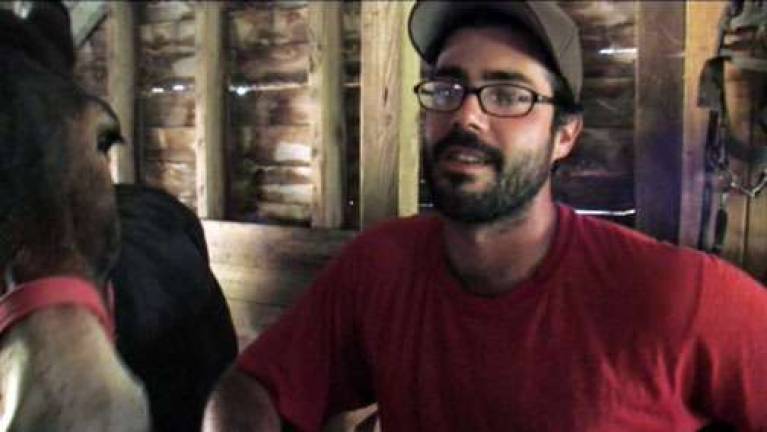Hoofing it on Jersey farms

If going into farming is financially risky, farming with beasts of burden might as well be Russian roulette.
I wish I was doing something more secure, financially, especially when my body starts to hurt, said Tom Paduano, a central character in a documentary about a new generation of farmers eschewing a centurys advances in agriculture in favor of horses and oxen. Call it an industrial de-evolution.
Paduano was plodding unhappily along as a computer systems engineer, when he took an 85 percent pay cut to become a farm intern. After hed gotten his first taste of farming with Budweiser-esque draft horses, even Paduanos dad, who doesnt like horses, could see his son had found his calling.
The non-Mennonite farmers doing it the Amish way are small in number, mostly broke, and very tired. (A farmer walks nine miles behind his horse or oxen for every acre plowed.) Only about 12 farmers in the Garden State whose farmland is the second most expensive in the country use draft power.
But its a resolute bunch and theyre getting attention. The same day about 75 people gathered at Sussex County Community College for a screening of The Farmer and the Horse, the NY Times ran an article in its dining section: On Small Farms, Hoof Power Returns.
Paduano wants to save enough money to start his own horse-powered farm. At first it will be hard, yeah, but it could be something that could eventually be easier, because it could be more beautiful than driving around on a tractor, he said. He knows hes romanticizing farming, and hell, why not? But hes determined above all to make it work: if he cant make ends meet, hed rather farm with a tractor than not at all.
Farmers drawn to draft power tend to have a lot in common, including, as movie-goer Michael Bengis of Hopatcong pointed out in the Q&A, a penchant for facial hair. But when it comes to their motivations for making a hard life harder still, each of these farmers seems to be following a deeply ingrained, highly personal instinct.
Heres a sampling: I dont want my future to be dependent on my ability to buy fuel. You can become friends with a horse. People were happier when they lived a simpler lifestyle. Using Gods creatures is more in balance with creation. Its more fun. Theres no exhaust or danger of oil or hydraulic fluid dripping into your soil or water supply. A tractor is a machine that takes labor away from people. You can hear the birds singing while youre following the plow.
A farm intern who relocated to Jersey from the Adirondacks simply finds no appeal to farming with tractors. (I dont think hes crazy, said his wife, sounding like a similar but slightly milder adjective might suit.)
There are little bonuses, too, like being able to use animal poop as fertilizer, and plow the fields when theyre damp, which must have been particularly advantageous this rainy spring.
For Paduano, a man of few words, its hard to explain why hes pursuing what might have been his great-great-grandfathers occupation.
It just feels right when everythings clicking together, he said, his eyes casting around. Then he looked straight at the camera. When everything comes together on the farm, it feels good.
The Farmer and the Horse 76 minutes; Directed by Jared Flesher
Next from Jared: Sourlands, about Jerseys last great forest